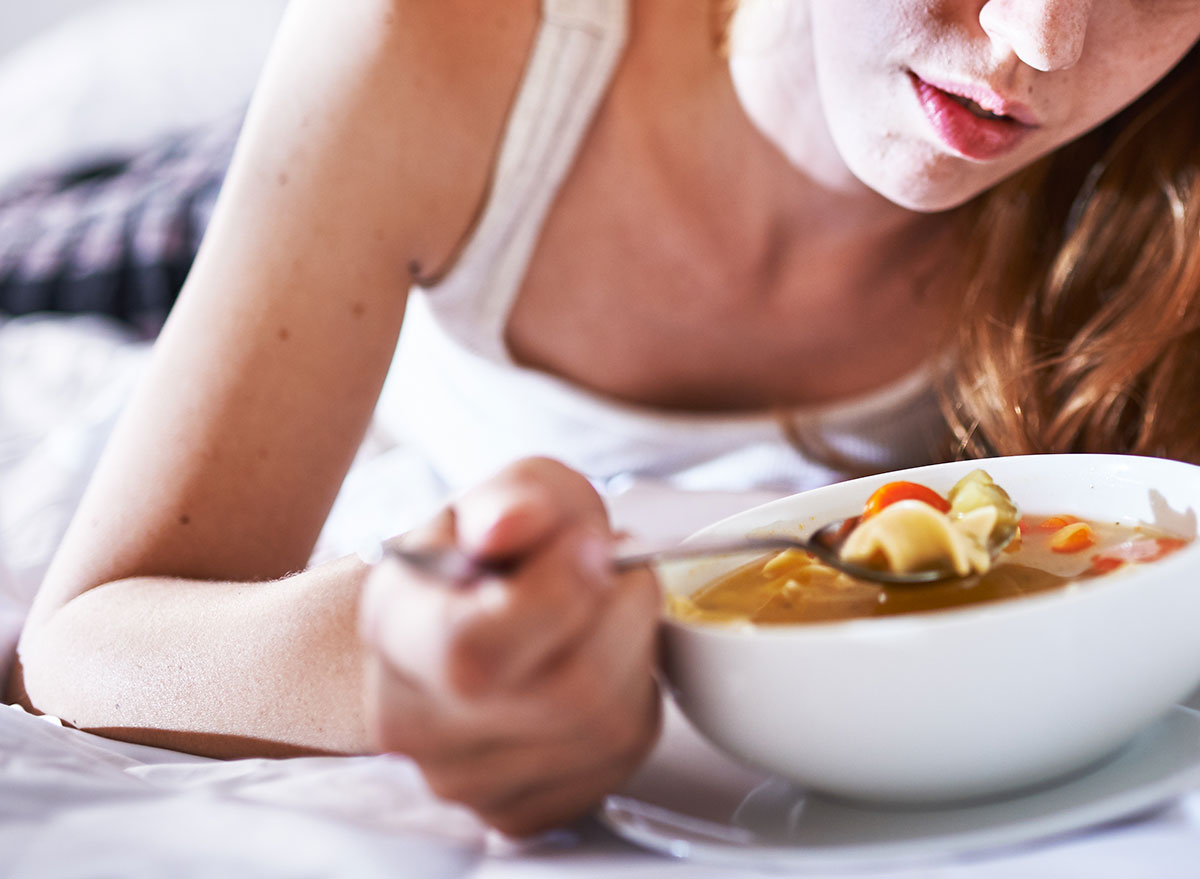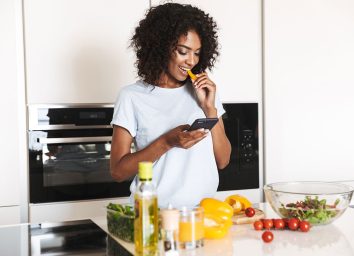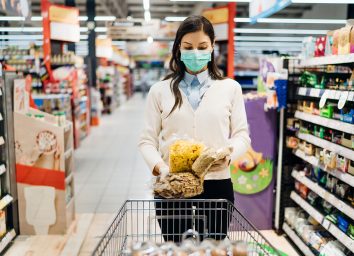I Had Coronavirus, and It Completely Changed My Appetite

The personal essay below was written by a 29-year-old female who lives in Brooklyn and is recovering from COVID-19. She is graciously willing to share her story with Eat This, Not That! in order to help others, but has asked to remain anonymous.
I’m a confirmed COVID-19 case in New York City, having just recovered after spending fourteen days in quarantine.
I was lucky to only have a mild case and to have recovered quite quickly in about five days, but the disease tested my willpower, mental health, and physical wellbeing. Ever since I first started noticing symptoms, I’ve been bunkered down by myself in my studio apartment in Brooklyn. The isolation has been challenging, but it’s worth it knowing that I’m not spreading the virus any further.
When I started to exhibit symptoms, I assumed it was just the flu.
After developing a dry cough one night, I woke up to find that I had an uncomfortable fever, accompanied by body aches and rapid changes in my body temperature. These symptoms were not unlike any of the flus I’ve had in the past, and I assumed the tightness in my chest was from the stress of potentially having COVID-19. But, I was also equally aware that it was one of the symptoms of the disease, so I started to get concerned.
I immediately called my primary care doctor and told them about my concerns. They directed me to an online health portal for a virtual screening, and after telling them my symptoms, I was approved for a test at NYU Langone hospital. Within 48 hours after making that first phone call, I drove myself in my own car to be tested for COVID-19 at the hospital. Oddly enough, by that point, I was actually beginning to feel better… but 12 hours later, back at my apartment, I was notified via a typed message from my primary care doctor that I had tested positive for COVID-19.
Once again, I immediately called my primary care doc, who ordered me to quarantine myself for 14 days (starting from the day I began developing symptoms) and to continue my at-home remedies: Taking cold medicine, drinking lots of fluids, and resting as much as possible.
I was also instructed to monitor my symptoms to see if they became worse or if I developed a shortness of breath. In that case, I would have to call my doctor for next steps, but they strongly urged me to not physically take myself to the emergency room or urgent care, because that could make me even more sick or put others at risk of becoming infected.
Along with the typical COVID-19 symptoms, I also noticed a change in my appetite.
As soon as I fell ill, I experienced a drastic loss of appetite and even noticed that I had trouble tasting things. These symptoms, in particular, actually ended up lasting much longer than the others. In the first few days, I could only manage to eat plain toast or peanut butter and jelly sandwiches—the thought of any other food was enough to make my stomach churn.
I also barely had any energy to cook, which is why I stuck to what was easy to prepare, even though I had just stocked up on fresh groceries to help me get through the next few weeks in my studio apartment.
None of my food-related symptoms really concerned me though, because when I was young, my mother would comfort me with buttered toast and ginger ale when I was sick (which was usually all I could manage to get down).
With coronavirus, I prioritized drinking as many fluids as possible, including tea with honey and beverages that are full of electrolytes and vitamins (think: Gatorade, Pedialyte, and Emergen-C).
Over the next week, I tried eating more adventurous foods like grilled cheese, macaroni and cheese, and frozen pizza, but not even pasta sounded tolerable. I didn’t even miss something that’s so ingrained in my daily life: My morning cup of coffee. In fact, after fourteen days, I’ve only managed to drink one cup!
Thankfully, during my second week of isolation, I’ve actually had enough energy to make pasta and chicken, and I’ve regained my ability to taste food again—so much so, that I plan on baking something sweet soon. Still, I’ve lost ten pounds in these two weeks due to the strange shifts in both my taste buds and appetite.
Weirdly, I’ve also yet to develop a craving for salad or fresh vegetables again, which is odd, considering I try to eat healthy on a daily basis, especially when eating lunch at the office.
I was lucky enough to have a mild case, so my symptoms weren’t that bad. What burdened me most was not knowing if I had spread it to anyone.
The hardest part for me throughout this entire journey was not the loss of appetite or taste, nor the fever, cough, or body aches. It was the anxiety, guilt, and worry that inevitably comes with having coronavirus.
I was anxious to let others know that I had contracted COVID-19 out of fear that they would ostracize and be afraid of me (an extrovert’s worst nightmare). However, once I shared my story on social media, I was greeted with a flood of support and kind words from friends and family.
If you, too, are dealing with anxiety and fear like many of us are (regardless of whether or not you have coronavirus, I suggest turning off the news), logging off social media, and finding positive activities that keep your mind occupied. Take a safe, daily walk outside for a change in scenery. And, most importantly, stay hopeful, because this will not last forever.
My best advice? Call your doctor if you think you’re exhibiting symptoms.
For those of you wondering if you have COVID-19 symptoms, before reading any more articles, you should call your doctor—heavy emphasis on calling. Many offices are well-equipped to host virtual appointments to help diagnose your symptoms. Your doctor is the best resource for understanding why you’re feeling the way you are, and, at the very least, talking to them can put your worries to rest.
Additionally, if you think you have COVID-19 symptoms (and they’re mild), but you don’t have the resources to access a test, don’t panic. I suggest you continue to quarantine at home for fourteen days. It’s the right thing to do to protect others from getting sick as well.
Just remember, we’re all in this together.








